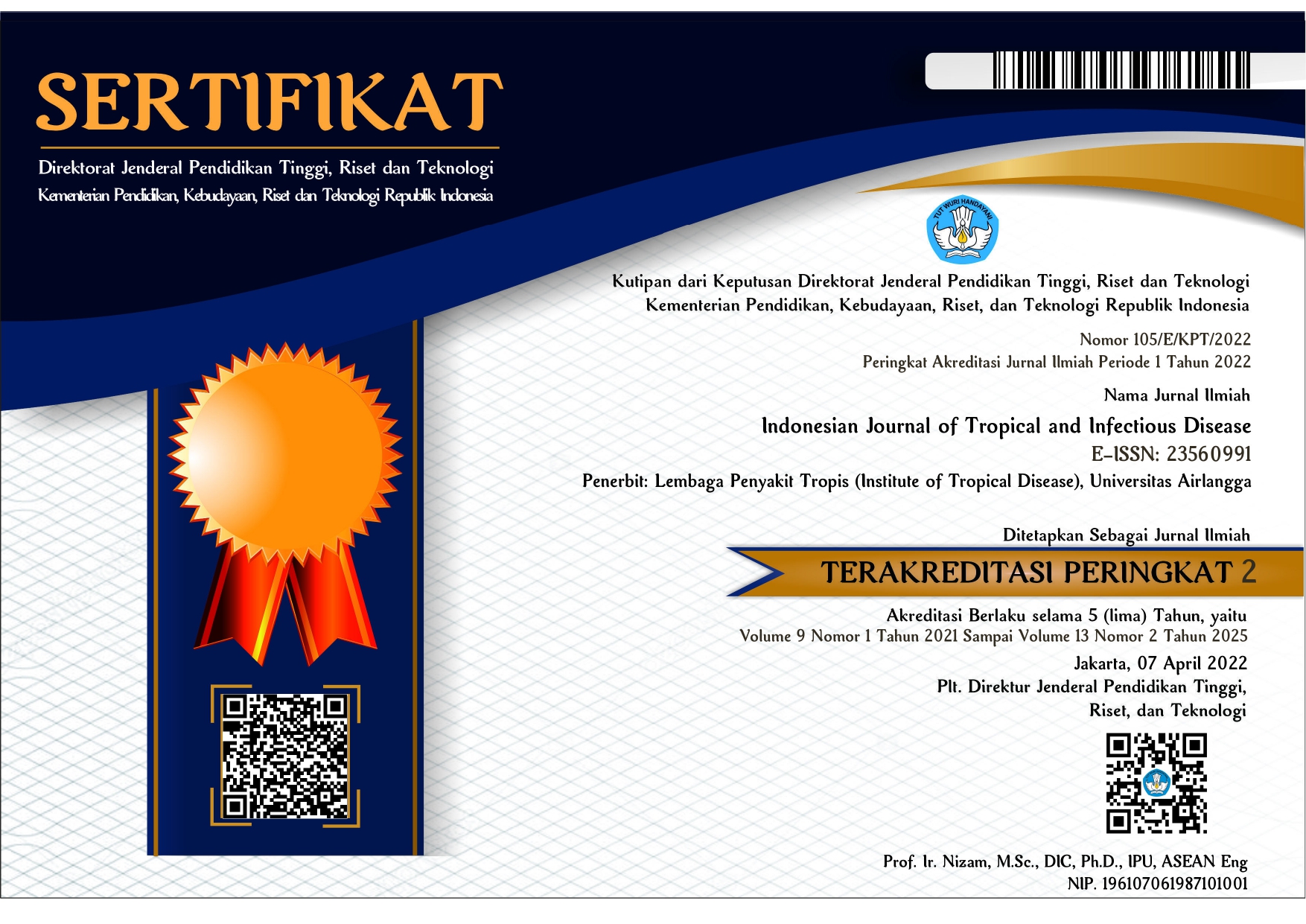THE IMMUNOSTIMULAN POTENTIAL OF TENGGULUN (PROTIUM JAVANICUM) LEAVES TOWARDS T CELL CD4+ AND IFNγ SECRETION ON PBMC CHICKEN
Downloads
One of the plants with immunostimulant activity is Tenggulun leaves which contain of flavonoid, like terpenoid. The aim of this research is to find the potential of Tenggulun's leaves extract to have the immunostimulant activities. The potential of immunostimulant activity is identified by the increasing the amount of T-cell CD4+ expression and IFNγ secretion. The research method is conducted through cultured chicken PBMC which is infected by ND virus; it is then treated with Tenggulun's leaves extract with immunostimulant. The result of immunocitochemistry examination CD4+ secretion on PBMC cultures shows how tenggulun is significantly different from the control in the secretion CD4+. The 10μg of tenggulun extract can modulate the T cell CD4+ secretion 68.8±0.83. It is significantly different from K (control) (p<0,05) and treatment group K+, P0, and P1. The examination of IFNγ level using ELISA from tenggulun leaves extract of 10μg doses were inoculated after being infected by ND virus contained immonostimulant potential in increasing the secretion of IFNγ 120.91±6.44. It is significantly different from K-, K+, and P1, yet not significantly different from P0. The content of terpenoid can increase IFNγ secretion on the macrofag cells culture and limfosit cells.
Devagaran T, Diantini A. Senyawa Immunomodulator Dari Tanaman. Students e-Journals. 2012;1(1):1–2.
Tjay TH, Rahardja K. Obat-Obat Penting Khasiat, Penggunaan dan Efek Sampingnya. Edisi Keenam. Jakarta: PT. Elex Media Komputindo; 2007.
Jain M, Ganju L, Katiyal A, Padwad Y, Mishra KP, Chanda S, et al. Effect of Hippophae rhamnoides leaf extract against Dengue virus infection in human blood-derived macrophages. Phytomedicine. 2008 Oct;15(10):793–9.
Thomson AW, Lotze MT. The Cytokine Handbook (Fourth Edition). Fourth Edi. Academic Press; 2003.
Baratawidjaja K. Penggunaan Herbal Medisin Untuk Imunostimulator dan Kemopreventif. 2006;
Sanjaya IMA. Isolasi dan Identifikasi Senyawa Atsiri Yang Memiliki Aktivitas Antibakteri Pada Daun Tenggulun (Protium javanicum Burm. F.). Universitas Udayana; 2002.
Sukmajaya IGP. Isolasi dan uji aktivitas antiinflamasi minyak atsiri daun tenggulun (Protium javanicum Burm. F.). Universitas Udayana; 2012.
Amaral MPM, Braga FA V, Passos FFB, Almeida FRC, Oliveira RCM, Carvalho AA, et al. Additional Evidence for the Anti-inflammatory Properties of the Essential Oil of Protium heptaphyllum Resin in Mice and Rats. Lat Am J Pharm. 2009;28(5):775–82.
Zoghbi M das GB, Maia JGS, Luz AIR. Volatile Constituents from Leaves and Stems of Protium heptaphyllum (Aubl.) March. J Essent Oil Res. 1995 Sep;7(5):541–3.
Lambrecht B, Gonze M, Meulemans G, van den Berg TP. Asessment of the Cell Mediated Immune Respons in Chicken by Detection of Chicken Interferron Gamma in Respon to Mitogen and Recall Newcastle Disease Viral Antigen Stimulation. Avian Pathol. 2004 Jun;33(3):343–50.
Ahmed KA, Saxena VK, Ara A, Singh KB, Sundaresan NR, Saxena M, et al. Immune response to Newcastle disease virus in chicken lines divergently selected for cutaneous hypersensitivity. Int J Immunogenet. 2007 Dec;34(6):445–55.
Patel K. A Review on Herbal Immunoadjuvant. Int J Pharm Life Sci. 2012;3(3):1568.
Rahman MM, Uyangaa E, Eo SK. Modulation of Humoral and Cell-Mediated Immunity Against Avian Influenza and Newcastle Disease Vaccines by Oral Administration of Salmonella enterica Serovar Typhimurium Expressing Chicken Interleukin-18. Immune Netw. 2013 Feb;13(1):34.
Islam M, Parvin M, Akhter J, Islam M, Siddique M, Rashid M. Clinical Evaluation of Hyperimmune Serum for the Treatment of Newcastle Disease in Indigenous Layer Birds. Bangladesh Journals OnLine (BanglaJOL). 2014 Jun 10;24(1–2).
Sick C, Schneider K, Staeheli P, Weining KC. Novel chicken CXC and CC chemokines. Cytokine. 2000 Mar;12(3):181–6.
Cruz GVB, Pereira PVS, Patrício FJ, Costa GC, Sousa SM, Frazí£o JB, et al. Increase of cellular recruitment, phagocytosis ability and nitric oxide production induced by hydroalcoholic extract from Chenopodium ambrosioides leaves. J Ethnopharmacol. 2007 Apr 20;111(1):148–54.
Neves-Souza PC, Azeredo EL, Zagne SM, Valls-de-Souza R, Reis SR, Cerqueira DI, et al. Inducible nitric oxide synthase (iNOS) expression in monocytes during acute Dengue Fever in patients and during in vitro infection. BMC Infect Dis. 2005 Dec 18;5(1):64.
The Indonesian Journal of Tropical and Infectious Disease (IJTID) is a scientific peer-reviewed journal freely available to be accessed, downloaded, and used for research. All articles published in the IJTID are licensed under the Creative Commons Attribution-NonCommercial-ShareAlike 4.0 International License, which is under the following terms:
Attribution ” You must give appropriate credit, link to the license, and indicate if changes were made. You may do so reasonably, but not in any way that suggests the licensor endorses you or your use.
NonCommercial ” You may not use the material for commercial purposes.
ShareAlike ” If you remix, transform, or build upon the material, you must distribute your contributions under the same license as the original.
No additional restrictions ” You may not apply legal terms or technological measures that legally restrict others from doing anything the license permits.























